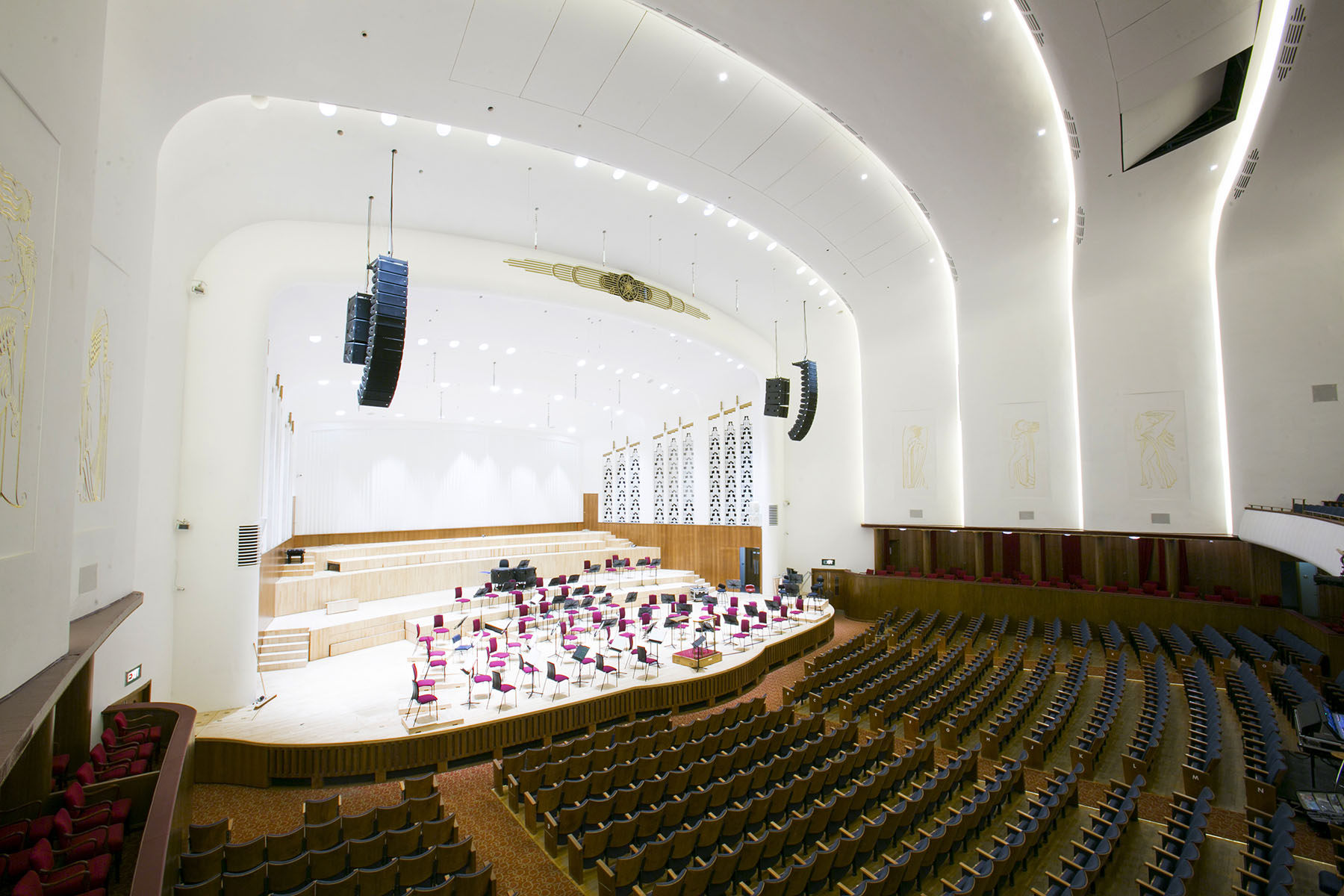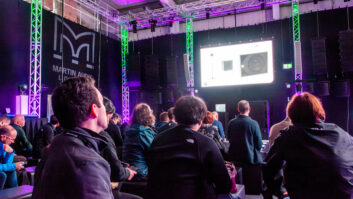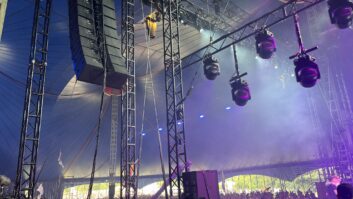
The UK’s first Coda Audio ViRAY sound system has been installed into Liverpool Philharmonic Hall, home of the Royal Liverpool Philharmonic Orchestra and one of the UK’s premier arts and entertainment venues.
Following a competitive tendering process, Adlib’s Installation department was appointed to complete the specification: the supply and installation of a new state-of-the-art sound system into the Grade II*-listed venue.
Adlib’s installation director Roger Kirby and MD Andy Dockerty worked closely with Coda Audio UK’s application engineer, Edgar Krueger, while the installation and system commissioning was co-ordinated by Adlib’s System Technician George Puttock working alongside Gilbert-Ash, the main contractor. The installation is part of the ongoing £13.8 million refurbishment of the venue, which commenced in May 2014 and is set for completion in autumn 2015 – although the venue reopened midway through the project, on 13 November.
Liverpool Philharmonic Hall presents more than 250 concerts and events annually of every genre – from rock and pop, classical, opera, folk and roots as well as comedy, film, spoken word, conferences and private events.
Roger Kirby stated: “’Multifunctional’ had to be right at the essence of any new system design for Liverpool Philharmonic Hall. Flexibility was also crucial, together with the provision of top quality audio with an infrastructure capable of dovetailing with current touring sound rigs.
“Coda’s ViRAY ticked all the boxes as a compact 3-way symmetrical line array module specifically designed for applications like this that need extremely good and solid sound with outstanding intelligibility. ViRAY is impressively coherent, has a high output and looks elegant, which is essential in a building like Liverpool Philharmonic Hall with its beautiful, original art deco style architectural features.”
The main PA hangs comprise 14 flown Coda ViRAY per side, supported by three Coda SC2-F bass units flown immediately behind the main arrays.
At the heart of the ViRAY sound is the newly developed dual diaphragm planar-wave-driver – a 2-way coaxial system utilising two concentric annular ring diaphragms. Each driver covers a smaller frequency range – for increased power handling, high dynamic and very low distortion. The larger annular mid-range diaphragm covers the 600Hz – 6.5kHz frequency range with a smooth linear response.
Three Coda SCP subs (with dual 18in drivers) are ground-stacked each side of the stage and sensor controlled for improved accuracy.
Both the flown SC2-F bass extensions and the SCP subs feature Coda’s award winning ‘Sensor Controlled’ technology, which combines a closed-loop feedback control with large, low-noise laminar flow ports, enabling the speakers to offer increased output and a well-controlled response.
The package included a series of four Coda TiRAY full range front-fills which can be deployed across the stage lip to cover the front row of the stalls due to the curvature of the stage.
Eight Coda G308s are also an integral part of the installation used as choir-fill monitors, located just upstage of the pros arch, and used to deliver audio coverage to the stage and the upstage choir stalls.
All the ViRAY elements are powered by 14 Coda Linus 10 DSP amps – a dual channel networkable amp with DSP comparator offering sensor control and delivering 10kW of clean power in a lightweight 19in 2U package.
A dedicated returns multicore is used to connect the FOH console to the Linus 10 amp racks at side stage, and additional signal processing and control for day-to-day peripherals is managed by BSS Soundweb BLU160 processors. This was picked for its flexible switching and its routing of balanced signals for the SCP subs, in-fills and choir-fill speakers.
Adlib specified a Soundcraft Vi3000 console as the FOH desk. This was chosen for its multiple features, proven quality and renowned reliability. The 96-channel console offers excellent sound, an intuitive user-interface and is highly adaptable. It also has new aesthetics with a more efficiently designed control surface, complete with 36 faders, 24 mono/stereo busses and an impressive sweeping black screen panel with four Vistonic II touchscreen interfaces and new 3D graphics!
With the four touchscreens, the Vi3000 is believed to be the only console of its class that can be programmed and used simultaneously by two or more engineers.
As part of the full sound package, Adlib also provided on-site training for the Philharmonic house crew, who started with learning the fundamentals and philosophies of the system so they can optimise the new equipment, including Adlib’s patch and tie-line systems and the ViRAY. Additional instruction was given on rigging and speaker system operation and maintenance.
Richard Curtis, Liverpool Philharmonic’s acting technical manager, commented: “Visiting engineers and our audiences have commented positively about the quality of the new sound, and smaller system components onstage have eradicated sightline issues whilst still providing an excellent sonic experience for our audiences. I look forward to our continuing relationship with Adlib in supporting Liverpool Philharmonic’s aim to provide excellent show production for our musicians, clients and audiences alike.”







